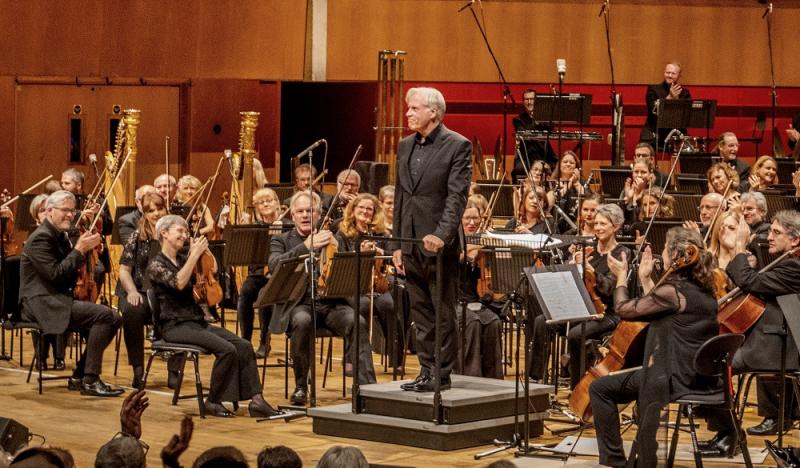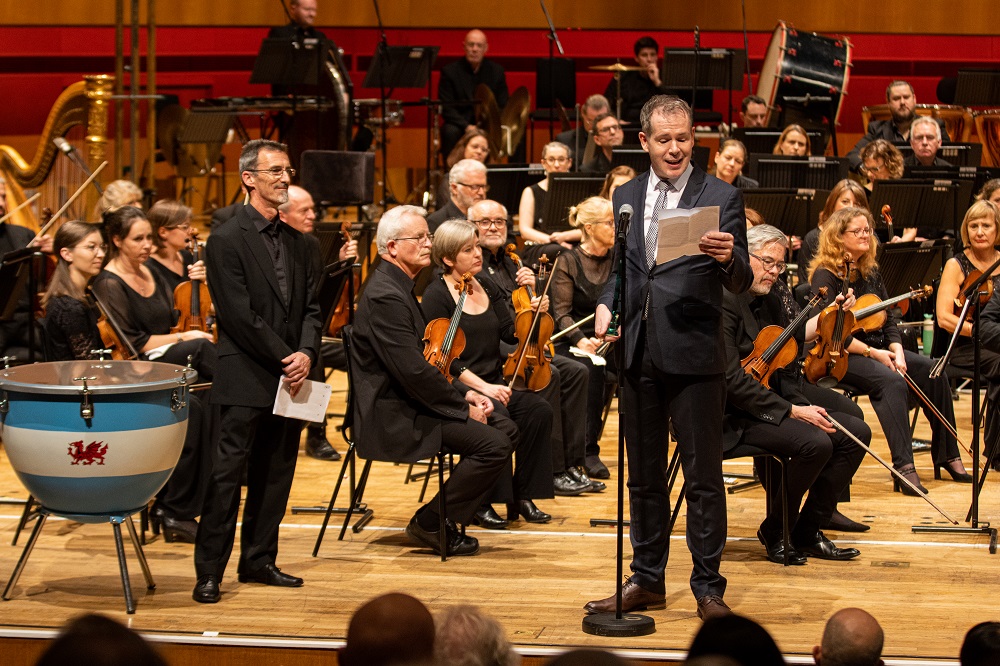Mahler 9, BBC NOW, Stenz, St David's Hall, Cardiff review - passionate without bloodshed on the rostrum | reviews, news & interviews
Mahler 9, BBC NOW, Stenz, St David's Hall, Cardiff review - passionate without bloodshed on the rostrum
Mahler 9, BBC NOW, Stenz, St David's Hall, Cardiff review - passionate without bloodshed on the rostrum
Superb orchestral playing loud and soft, and a touching award

What a fascinating work Mahler's Ninth Symphony is! Marvellous and astonishing as well, of course. But these qualities are, so to speak, written into the score (did Mahler ever compose anything not designed to astonish?).
Yet the fascination comes from outside, from the music’s time and place. And for various reasons Markus Stenz's performance, in front of a surprising number of unoccupied seats in Cardiff’s St.David’s Hall, hinted strongly at this aspect while by no means downplaying the others.
Powerful and profoundly engaged though it was, this was not a performance that bled visibly, as so many have done in the past. Stenz is even a somewhat disconcerting figure to watch on the rostrum (pictured below in rehearsal). Especially when lounge-suited, as here, he radiates a slightly bureaucratic bonhomie remote from the authoritarianism of the baton, something he in fact doesn’t use. He works through discreet gestures, a nod and a wink, facial expression conveying something that the hands perhaps can’t quite. Pauses – a crucial part of Mahler’s discourse – are controlled without ostentation, yet given full, even more than full value. Mahler’s broken phrases are allowed to gasp for themselves, without directorial gasps.
 The result says something very deep about music in 1908-9, when Mahler wrote this, his last completed work. Those were the years of Schoenberg’s and Webern’s first atonal works, the logical consequence, Schoenberg argued, of recent developments in tonal music. But Mahler found a different way, richer to my mind and more suggestive. He wrote tonal music that constantly dodges, but never denies, the tiresome issue of having to be in some key or other.
The result says something very deep about music in 1908-9, when Mahler wrote this, his last completed work. Those were the years of Schoenberg’s and Webern’s first atonal works, the logical consequence, Schoenberg argued, of recent developments in tonal music. But Mahler found a different way, richer to my mind and more suggestive. He wrote tonal music that constantly dodges, but never denies, the tiresome issue of having to be in some key or other.
If you listen closely to the extraordinary first theme of the Ninth, you may notice that it studiously avoids the keynote (D, as it happens: it comes just once, on a very weak beat); yet who could deny that this is a melody in D, even without the harmony? The other thing this beautiful, highly singable tune does is keep stopping. It has more breaks than the most unionised factory worker. In 1909 Webern was writing music that almost disintegrated the old-fashioned idea of melodic line. Mahler has his own way of doing something comparable but less fissile. His music continuously fragments, but the fragments are always recognisably bits of something one knows, because the music has already told us about them. It’s a new kind of symphonic technique; but atonal it ain't.
It certainly doesn’t make life easy for the orchestra, but the Welsh players handled it all with superb aplomb. No doubt deliberately, Stenz gave more than usual prominence to the woodwind sections, who often rode, rather convincingly, over the strings. It’s true that Mahler writes very freely for all the wind sections, as it were inviting a reverse perspective in the sound. Occasionally it’s almost as if he distrusts the first violins, so often does he give leading material to the seconds. But the truth is that his orchestra is a kind of controlled, constantly varied, in-and-out landscape of equals, until the very last page of the final Adagio, where the music comes as close to vanishing while still audible as one could believe possible.  The string playing here was of a delicacy I’ve seldom heard equalled. The sense of annihilation was hardly even disturbed by the sudden noisy and apparently panic-stricken exit of a young man from the front stalls: in a way it was even enhanced. And at the end Stenz held a long, long silence that Mahler, who loved devout pauses, would surely have appreciated. It was a fitting conclusion to a performance full of passionate, overwhelming complexity of sound punctuated by finely controlled pauses that expressed, not relief or relaxation, but the bewilderment that is the emotional heart of this amazing work.
The string playing here was of a delicacy I’ve seldom heard equalled. The sense of annihilation was hardly even disturbed by the sudden noisy and apparently panic-stricken exit of a young man from the front stalls: in a way it was even enhanced. And at the end Stenz held a long, long silence that Mahler, who loved devout pauses, would surely have appreciated. It was a fitting conclusion to a performance full of passionate, overwhelming complexity of sound punctuated by finely controlled pauses that expressed, not relief or relaxation, but the bewilderment that is the emotional heart of this amazing work.
At the start of the concert James Murphy, CEO of the Royal Philharmonic Society, presented the orchestra’s chief percussionist, Chris Stock (pictured above) with the society’s orchestral award, particularly for his charitable work raising money to buy musical instruments for children in Patagonia whose own instruments had been destroyed in a fire. As Chris admitted in his acceptance speech, percussion playing itself is an up-and-down affair, in Mahler 9 “a bit of not much”, though noisy when it bothers. But it was a nice thought that through his work children in Patagonia – a well-known outpost of the Rhondda Valley – could bang on something a little more sophisticated and rewarding than empty oil drums.
rating
Explore topics
Share this article
The future of Arts Journalism
You can stop theartsdesk.com closing!
We urgently need financing to survive. Our fundraising drive has thus far raised £49,000 but we need to reach £100,000 or we will be forced to close. Please contribute here: https://gofund.me/c3f6033d
And if you can forward this information to anyone who might assist, we’d be grateful.

Subscribe to theartsdesk.com
Thank you for continuing to read our work on theartsdesk.com. For unlimited access to every article in its entirety, including our archive of more than 15,000 pieces, we're asking for £5 per month or £40 per year. We feel it's a very good deal, and hope you do too.
To take a subscription now simply click here.
And if you're looking for that extra gift for a friend or family member, why not treat them to a theartsdesk.com gift subscription?
more Classical music
 Bizet in 150th anniversary year: rich and rare French offerings from Palazzetto Bru Zane
Specialists in French romantic music unveil a treasure trove both live and on disc
Bizet in 150th anniversary year: rich and rare French offerings from Palazzetto Bru Zane
Specialists in French romantic music unveil a treasure trove both live and on disc
 Scottish Chamber Orchestra, Ibragimova, Queen’s Hall, Edinburgh review - rarities, novelties and drumrolls
A pity the SCO didn't pick a better showcase for a shining guest artist
Scottish Chamber Orchestra, Ibragimova, Queen’s Hall, Edinburgh review - rarities, novelties and drumrolls
A pity the SCO didn't pick a better showcase for a shining guest artist
 Kilsby, Parkes, Sinfonia of London, Wilson, Barbican review - string things zing and sing in expert hands
British masterpieces for strings plus other-worldly tenor and horn - and a muscular rarity
Kilsby, Parkes, Sinfonia of London, Wilson, Barbican review - string things zing and sing in expert hands
British masterpieces for strings plus other-worldly tenor and horn - and a muscular rarity
 From Historical to Hip-Hop, Classically Black Music Festival, Kings Place review - a cluster of impressive stars for the future
From quasi-Mozartian elegance to the gritty humour of a kitchen inspection
From Historical to Hip-Hop, Classically Black Music Festival, Kings Place review - a cluster of impressive stars for the future
From quasi-Mozartian elegance to the gritty humour of a kitchen inspection
 Shibe, LSO, Adès, Barbican review - gaudy and glorious new music alongside serene Sibelius
Adès’s passion makes persuasive case for the music he loves, both new and old
Shibe, LSO, Adès, Barbican review - gaudy and glorious new music alongside serene Sibelius
Adès’s passion makes persuasive case for the music he loves, both new and old
 Anja Mittermüller, Richard Fu, Wigmore Hall review - a glorious hall debut
The Austrian mezzo shines - at the age of 22
Anja Mittermüller, Richard Fu, Wigmore Hall review - a glorious hall debut
The Austrian mezzo shines - at the age of 22
 First Person: clarinettist Oliver Pashley on the new horizons of The Hermes Experiment's latest album
Compositions by members of this unusual quartet feature for the first time
First Person: clarinettist Oliver Pashley on the new horizons of The Hermes Experiment's latest album
Compositions by members of this unusual quartet feature for the first time
 Gesualdo Passione, Les Arts Florissants, Amala Dior Company, Barbican review - inspired collaboration excavates the music's humanity
At times it was like watching an anarchic religious procession
Gesualdo Passione, Les Arts Florissants, Amala Dior Company, Barbican review - inspired collaboration excavates the music's humanity
At times it was like watching an anarchic religious procession
 Classical CDs: Camels, concrete and cabaret
An influential American composer's 90th birthday box, plus British piano concertos and a father-and-son duo
Classical CDs: Camels, concrete and cabaret
An influential American composer's 90th birthday box, plus British piano concertos and a father-and-son duo
 Cockerham, Manchester Camerata, Sheen, Martin Harris Centre, Manchester review - re-enacting the dawn of modernism
Two UK premieres added to three miniatures from a seminal event of January 1914
Cockerham, Manchester Camerata, Sheen, Martin Harris Centre, Manchester review - re-enacting the dawn of modernism
Two UK premieres added to three miniatures from a seminal event of January 1914
 Kempf, Brno Philharmonic, Davies, Bridgewater Hall, Manchester review - European tradition meets American jazz
Bouncing Czechs enjoy their Gershwin and Brubeck alongside Janáček and Dvořák
Kempf, Brno Philharmonic, Davies, Bridgewater Hall, Manchester review - European tradition meets American jazz
Bouncing Czechs enjoy their Gershwin and Brubeck alongside Janáček and Dvořák
 Solomon, OAE, Butt, QEH review - daft Biblical whitewashing with great choruses
Even a top soprano and mezzo can’t make this Handel paean wholly convincing
Solomon, OAE, Butt, QEH review - daft Biblical whitewashing with great choruses
Even a top soprano and mezzo can’t make this Handel paean wholly convincing

Add comment